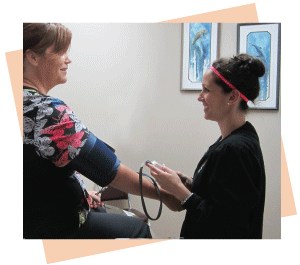
Hypertension Hypertension, also known as high blood pressure or arterial hypertension, is a chronic medical condition in which the blood pressure in the arteries is elevated. f you have a family history of high blood pressure and heart disease, you will be more likely to have high blood pressure. Additionally if you are overweight you will be more likely to develop high blood pressure. Blood pressure is specified by two measurements, the systolic and diastolic pressures, which are the maximum and minimum pressures in the arterial system. The systolic pressure occurs when the left ventricle is most contracted; the diastolic pressure occurs when the left ventricle is most relaxed before the next contraction. Hypertension is present if the blood pressure is persistently at or above 140/90 millimeters mercury (mmHg) for most adults. Normal blood pressure at rest is within the range of 100–140 mmHg systolic and 60–90 mmHg diastolic. Hypertension usually does not cause symptoms initially, but sustained hypertension over time is a major risk factor for hypertensive heart disease, coronary artery disease, stroke, aortic aneurysm, peripheral artery disease, and chronic kidney disease. Prevention Dietary and lifestyle changes can improve blood pressure and decrease the risk of health complications. Lifestyle changes are recommended to lower blood pressure, before starting drug therapy.
Medication Medication is often necessary for people for whom lifestyle changes are not enough or are not effective. An improved life expectancy is associated with the treatment of moderately high arterial blood pressure with medication. |
|
 |
|